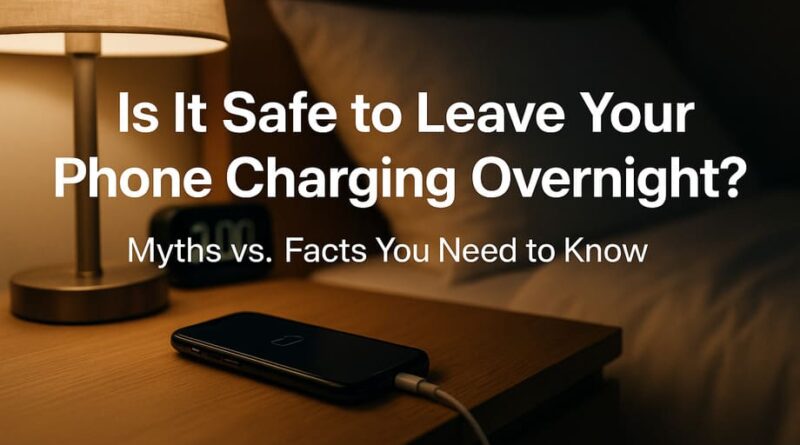Is It Safe to Leave Your Phone Charging Overnight?
Plugging in your phone before going to sleep has become second nature. You drop it on the nightstand, connect the charger, and wake up to a full battery. Simple, right? But a lot of people still wonder: could this habit actually hurt my phone in the long run?
The truth is that modern smartphones are built to handle overnight charging. They won’t explode, and they won’t “overfill.” Still, there are a few details about battery health and safety that are worth knowing if you want your phone to last longer.
Why Most People Charge Overnight
It’s easy to see why this habit is so common:
- Phones rarely survive a full day of heavy use.
- Charging while you sleep doesn’t interrupt your day.
- Everyone wants to start their morning at 100%.
It’s convenient, but convenience isn’t always the best for your battery’s lifespan.
What Actually Happens When a Phone Charges All Night
Lithium-ion batteries explained
Nearly every phone today uses a lithium-ion battery. Unlike old nickel batteries, they don’t suffer from “memory effect,” but they do wear down slowly with each charge cycle. Think of it like car mileage, every cycle is a few miles closer to the end.
Automatic cut-off at 100%
When the battery reaches 100%, your phone doesn’t keep sucking in power. Built-in charging circuits stop the flow. That’s why you can leave it plugged in without worrying about “overcharging.”
The trickle effect
Here’s the catch: once full, the battery naturally drops to 99%, then the charger tops it up again. This back-and-forth “trickle charge” isn’t dangerous, but over years it can add tiny amounts of wear.
Is It Actually Bad for Your Battery?
Understanding charge cycles
Every 0–100% charge counts as one cycle. Your phone can handle a few hundred before its capacity shrinks. Overnight charging adds more mini-cycles, which can shorten lifespan slightly.
Heat is the bigger problem
The real battery killer isn’t charging overnight, it’s heat. A phone charging under a pillow or in a hot case can get warmer than normal, and high heat slowly damages batteries.
Busting common myths
- No, your phone won’t blow up if you leave it plugged in.
- No, modern batteries can’t “overfill.”
- The actual risk comes from cheap or damaged chargers, not the act of charging overnight.
Safety Tips for Smarter Charging
- Stick to quality chargers – Buy official or certified third-party chargers. Cheap ones are risky.
- Keep it cool – Don’t charge under blankets, pillows, or in hot places.
- Avoid 0% and 100% extremes – Batteries prefer staying between 20% and 80%.
- Use smart features – Phones now include “optimized charging,” which learns your routine and only tops up to 100% before you wake up.
So, Should You Stop Charging Overnight?
If you have a modern phone and a reliable charger, overnight charging is generally safe. You won’t fry your battery, and you won’t cause immediate damage.
That said, making it an everyday habit for years can shave a bit off your battery’s long-term health. If you want to be extra careful, use optimized charging and unplug when you wake up.
Quick FAQs
Does overnight charging waste energy?
Hardly. Once full, your phone only sips tiny amounts of power.
Can it ruin the battery completely?
Not instantly. But constant overnight charging may shorten its lifespan a little faster.
What about wireless charging?
It’s safe too, though wireless pads usually generate more heat.
Conclusion
Leaving your phone charging overnight isn’t the danger many people think it is. Thanks to smart charging systems, it’s safe and convenient. Still, if you want to stretch your battery’s lifespan, it helps to avoid extreme temperatures, stick to quality accessories, and keep your charge levels in the sweet spot between 20% and 80%.
So, don’t panic if you leave it plugged in while you sleep—it won’t kill your phone. But a few small adjustments can keep your battery healthier for longer.
